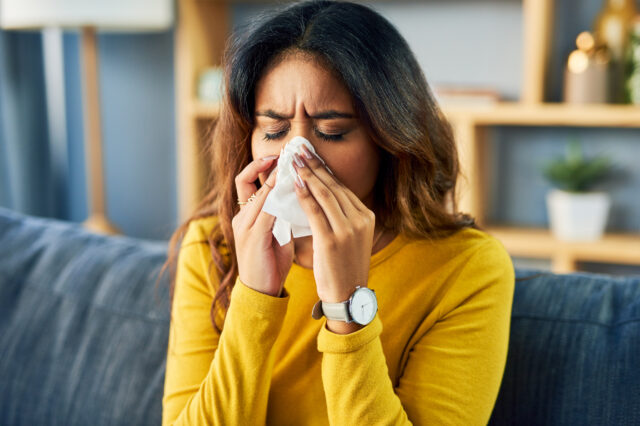All About Allergies
Allergic rhinitis, or allergies, can be anything from a mild annoyance that occurs seasonally to a very impactful, limiting and chronic problem. Fortunately, there are many treatment options.

It’s that time again in North Florida to see our cars covered in green pollen. You may already be noticing itchy eyes, sneezing or coughing. Allergic rhinitis, or allergies, can be anything from a mild annoyance which occurs seasonally to a very impactful, limiting and chronic problem. Fortunately, there are many treatment options.
How common are allergies?
Allergic rhinitis is very common. It affects anywhere from 10 to 30% of the population. The Asthma and Allergy Foundation of America estimates that 50 million Americans experience various types of allergies each year. It is the sixth leading cause of chronic illness in the United States. Thus, it is a very frequent reason for visits to a physician, whether in a primary care setting, urgent care or in the emergency room.
Are there different types of allergies?
Allergies can be broken into seasonal, perennial or episodic. Seasonal allergies tend to occur at certain times of the year. In the Southeast region of the United States, tree pollen peaks between January and May. There is another surge between the middle of August and the middle of October. Grass and weeds peak between the middle of May and October. Perennial allergies occur throughout the year and can be related to dust, animal dander or mold. Episodic allergies can be related to allergens such as food, insect stings, skin care products, etc.
Allergic rhinitis is often associated with other medical conditions such as eczema or asthma. The symptoms of allergies include rhinorrhea, sneezing, nasal congestion, itchy skin or rashes, coughing or even wheezing. “Allergic shiners” can sometimes be seen which is due to swelling and darkening of the veins below the eyes. In more severe cases, allergies can even lead to anaphylactic reactions which can be life-threatening, causing difficulty breathing.
How are allergies diagnosed?
Managing allergies starts with avoiding known triggers. Intranasal steroids such as fluticasone or mometasone are generally the first-line treatment and can be bought over-the-counter. These options are typically very safe and effective. Taking antihistamines, such as Claritin or Zyrtec, can also be very effective. These are newer antihistamines, and unlike Benadryl or diphenhydramine, cause less drowsiness. There are other medications, like montelukast, which block inflammatory agents within the immune system that contribute to allergic rhinitis. If these usual treatments do not work, there is the option of immunotherapy. Generally, this is through allergy shots, although there are now sublingual options for certain environmental allergies. This type of treatment seeks to provide some exposure to the allergen, and increase that over time, to reduce the body’s sensitivity in the future. There also are newer medications which can block certain types of the body’s immune cells in response to allergens. Before taking any medication, make sure to talk to your doctor about the best options for you.
Do hypoallergenic products work?
There are many thoughts on hypoallergenic products such as mattresses and pillow covers. My best advice would be to, again, avoid known triggers. That may be feathers or dust. It might require more frequent dusting and cleaning of your home environment. Follow your HVAC system guidelines on changing your filters. Good hand hygiene is always important. Avoid rubbing your eyes. Nasal saline or moisturizing eye drops might be beneficial. Many safe antihistamines can be found over-the-counter, as can intranasal steroids.
When should I see a doctor about my allergies?
It is best to seek medical attention for your allergies if you are not responding to the above mentioned treatments. In most cases, it is best to avoid, or at least limit, decongestants. They can sometimes raise blood pressure or heart rate. The nasal versions, such as Afrin, can sometimes cause rebound congestion. Those should be used for no more than three days.
To further manage your symptoms, seek the advice of a primary care provider. UF Health Family Medicine – Kernan Square is accepting new patients for in-person and Virtual Visits. Call 904-633-0585 or visit our website to schedule an appointment.
Visit UFJaxPrimaryCare.org to learn more about primary care services offered and browse all locations.